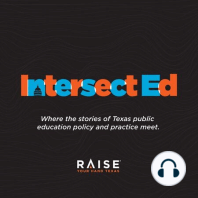16 min listen
Special Session: School Finance & Vouchers
FromIntersect Ed
ratings:
Length:
15 minutes
Released:
Oct 13, 2023
Format:
Podcast episode
Description
MORGAN SMITH: Welcome to the Raise Your Hand Texas Intersect Ed Podcast, where the stories of public education policy and practice meet. Today, we’re talking about the special legislative session that began Oct. 9, and the intense financial pressure facing Texas public schools.I’m your host, Morgan Smith.Gov. Greg Abbott has called state lawmakers back to Austin with strict orders to complete some unfinished business from the regular legislative session that ended back in May. And if you listened to our legislative recap episode, you know there’s a lot of that when it comes to education policy. But it’s not teacher pay raises, increases to per student funding to help districts keep up with inflation, or reforms to the state’s standardized testing and accountability system the governor has directed lawmakers to tackle. It’s passing an Education Savings Account that would allow parents to use taxpayer dollars to send their kids to private schools. There are a lot of reasons why this is bad policy for Texas, and so many lessons we can learn from the mistakes of other states that have already adopted these voucher-type programs — and we’ll get into all of that. But first, let’s unpack the current funding crisis in our public schools. During the regular session — despite a record-breaking $33 billion surplus sitting in the treasury — lawmakers failed to increase basic per student allotment enough for school districts to keep up with inflation, much less offer much needed teacher pay raises. At the same time, federal stimulus funding is about to end while many school districts have yet to regain the student enrollment they lost during the pandemic. As a result, school districts have had to make tough decisions about what services or positions to cut in order to minimize effects in the classroom. BOB POPINSKI: School districts were really hoping that there was going to be some legislative action during the regular session because they had to adopt their budgets here in July and August for the current school year. They were really bumped up against a lot of pressure. MORGAN SMITH: This is Bob Popinski, Raise Your Hand’s Senior Director of Policy. He says a substantial number of Texas school districts have adopted deficit budgets, drawing down fund balances intended to cover incidental costs until the next school year. BOB POPINSKI: They're having problems sustaining the revenue that they have in their school districts. And because inflation was in the double digits over the last few years, they're not able to keep pace with not only giving their teachers and staff a salary increase, but they're having trouble keeping pace with just fuel costs and property insurance costs, construction costs, health insurance costs.The cost of food has gone up. And there's added pressure to make sure that they're following laws that were passed last regular session, like armed guards on every campus. There's a lot of pressure for school districts to find the funding they need for a lot of different resources that they've been asked to do over the last few years.MORGAN SMITH: In Channelview ISD, a district of about 9,500 students on the eastern edge of Harris County, Superintendent Tory C. Hill says that they have had to increase student-teacher ratios across all grade levels to maintain a balanced budget.DR. TORY C. HILL: There's no secret that there's a teacher shortage. There's a teacher shortage in Channelview, there's a teacher shortage in the State of Texas, really across the entire nation. There were some aggressive things that we had to do in order to be able to attract teachers, and really that was to increase our teacher pay through the use of local funds as well as implement a very aggressive model to try to attract teachers, but that came with an expense of other things. Those challenges aren't going away, and so right now there is a balancing act. Ultimately at the end of the day, our goal is to ensure that we're not impacting student lea
Released:
Oct 13, 2023
Format:
Podcast episode
Titles in the series (23)
Missed Milestones: Graduating High School During a Global Pandemic: In our third episode of Intersect Ed, we will hear from several members of the Class of 2020 in Houston about how school closures and emergency remote learning impacted their final semester of high school. School leaders and educators will also share the ways they tried to help these seniors navigate their final days of high school in the midst of a global pandemic. by Intersect Ed
